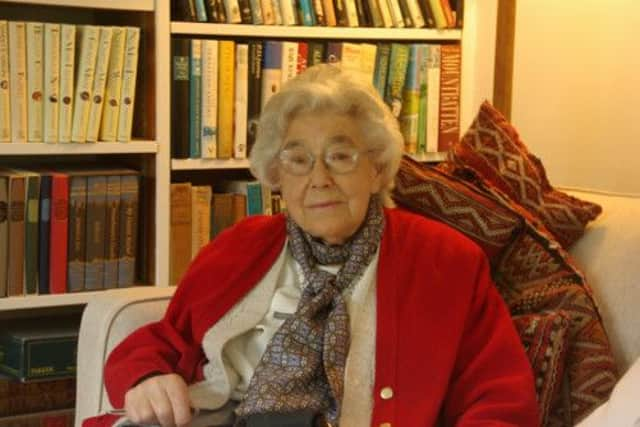Obituary: Margaret Jackson, MBE, principal secretary to the director-general of the Special Operations Executive (SOE)


MARGARET Jackson was one of the modest ladies who were entrusted with much responsibility and given authority during the Second World War.
As principal secretary to the director-general of the SOE she was privy to some of the most important secrets that came into the office of her boss, Brigadier (later Major-General Sir) Colin Gubbins.
Advertisement
Hide AdAdvertisement
Hide AdHer adventurous spirit and undoubted competence made her a central figure in SOE’s famous offices at 64 Baker Street, London.
When she arrived there were no radios and few contacts on the continent of Europe: Jackson greatly assisted in creating underground connections in France, Belgium, the Netherlands and Austria which were to prove essential, especially on D-Day and the advance on Berlin.
The SOE had been set up by Winston Churchill to “set Europe ablaze” and despite setbacks, mistakes and betrayals it made an invaluable contribution to winning the war.
Indeed, US general Dwight D Eisenhower wrote as peace was signed that, “the disruption of enemy rail communications, the harassing of German road moves and the continual and increasing strain placed on German security services throughout occupied Europe by the organised forces of resistance, played a very considerable part in our complete and final victory”.
It was praise that Jackson and the Baker Street Irregulars, as they came to be known, richly deserved.
Margaret Wallace Jackson came from a Scottish family – both parents were devout members of the Church of Scotland – and her father was a businessman in Argentina.
She attended a Methodist school in England and read modern languages at London University. She then spent time in France, becoming fluent in the language.
In 1940, Jackson joined the Royal Institute of International Affairs and joined a department in the War Office (Military Intelligence Research). There she heard that Gubbins was in London interviewing for a bilingual secretary to join him in the Paris office of a clandestine mission to liaise with resistance groups run by the Polish and Czech authorities in exile.
Advertisement
Hide AdAdvertisement
Hide AdJackson moved to Paris but after the German advance through France, she escaped to London on a hospital ship.
Later that year, Gubbins was seconded to SOE and Jackson joined him in putting into action the guerrilla tactics that were to prove so successful. The practice of disrupting the enemy’s lines of communications and transport were vital. As was the tough physical training that the SOE recruits had to undergo. Gubbins and Jackson acquired properties – often remote castles in the Highlands – to act as agent training bases.
The extensive training included a wide variety of underground warfare: the use of explosives; how to kill with their bare hands; all aspects of disguise; and how to derail trains. Another session included instructions on how to get out of handcuffs using only a piece of thin wire and a diary pencil.
Work for Jackson in Baker Street was no less intense. She often slept in makeshift beds in the office and had to rigidly remember her cover story so that even her close family never knew her real wartime occupation.
Under the concentrated management of Gubbins and Jackson, SOE expanded the radio coverage throughout occupied Europe and began sending out by aeroplanes agents into France to hamper the activities of the German army.
Jackson’s role was principally to co-ordinate the work of the senior secretaries who had to conform to strict rules of secrecy – even blotting paper had to be destroyed. Jackson also had to co-ordinate all incoming and outgoing telegrams.
When Gubbins became chief executive of the SOE in 1943, Jackson assumed further responsibilities in briefing agents before they flew to France. She became an authority on underground warfare and co-ordinating action by way of subversion and sabotage.
In May 2010, Jackson unveiled a plaque in Baker Street to commemorate the work of the SOE and her fallen comrades.
Advertisement
Hide AdAdvertisement
Hide AdIn a moving tribute, she said: “I was one of the very first members of an organisation to work from this building and create how, in wartime, we could carry out sabotage and thus cause as much harm by subversion to an enemy planning to invade us.”
Jackson presented her memories of serving in the fight against Nazism to the Imperial War Museum in London.
After the war, Jackson worked for the Allied Commission for Austria in Vienna and then at the Organisation of European Economic Co-operation where she rose to become a deputy secretary of the council for nearly four years.
One of her principal responsibilities was to join the team which implemented the Marshall Plan – America’s initiative to aid the reconstruction of war-torn Europe’s economies.
Jackson retired in 1978 and then served as a councillor in Southwark, south London, for eight years. Latterly, Jackson resided in a Methodist home in Croydon.
She was awarded an MBE in 1946, and remained unmarried.